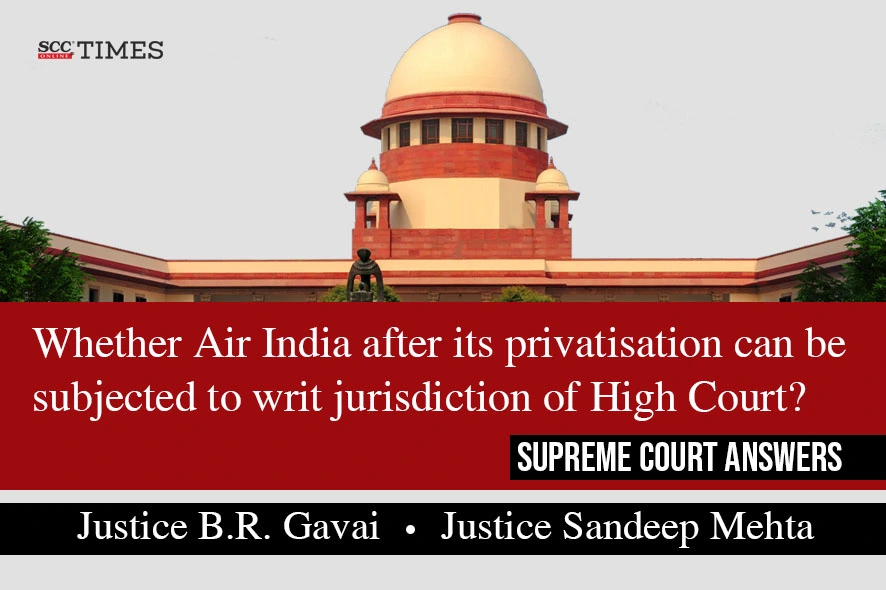Supreme Court: In appeals filed challenging the judgment passed by the Bombay High Court, wherein the Court dismissed four writ petitions instituted by the former employees of Air India Limited (‘AIL’) as members of its cabin crew force, the Division Bench of BR Gavai and Sandeep Mehta*, JJ. while upholding the impugned judgment, said that AIL, the erstwhile Government run airline having been taken over by the private company is not performing any public duty, since it has taken over the Government company for the purpose of commercial operations. Thus, no writ petition is maintainable against AIL.
Background:
The appellants were employed in AIL in the late 1980s and all retired between 2016 and 2018. The writ petitions were filed for alleged stagnation in pay and non-promotion of the employees. In each of the writ petitions, violation of Articles 14, 16, and 21 of the Constitution of India, was pleaded. The High Court denied relief as claimed on the ground of non-maintainability of the writ petitions owing to the intervening event of privatisation of AIL. Thus, the present appeals were filed.
Issues, Analysis and Decision:
The Court noted that Air India was a statutory body constituted under the Air Corporations Act, 1953. With the repeal of the Act of 1953 by the Air Corporations (Transfer of Undertakings) Act, 1994, Air India merged with Indian Airlines and upon incorporation, AIL became a wholly Government owned company and, thus, came under the category of ‘other authorities’ within the meaning of Article 12 of the Constitution of India. The Court said that this status of Air India continued to subsist on the date when the subject batch of writ petitions under Article 226 of the Constitution of India were filed before the High Court invoking writ jurisdiction, against respondent AIL. However, in 2021, the Government of India announced that it had accepted the bid of Talace India Pvt Ltd. to purchase its 100% shares in AIL. Subsequently, in 2022 pursuant to the share purchase agreement signed with Talace India Pvt. Ltd., 100% equity shares of the Government of India in AIL were purchased by the said private company and AIL was privatised and disinvested.
Therefore, as per the Court the writ petitions were maintainable on the date of institution but the question that arose before the High Court was whether they continued to be maintainable as on the date the same were finally heard.
Issues:
(i) Whether AIL, after having been taken over by a private corporate entity, could have been subjected to writ jurisdiction of the High Court?
The Court after referring to Kalpana Yogesh Dhagat v. Reliance Industries Ltd., 2016 SCC OnLine Guj 10186; Asulal Loya v. Union of India, 2008 SCC OnLine Del 838 and Tarun Kumar Banerjee v. BALCO, 2008 SCC OnLine Bom 1899, noted that the disinvestment of the Government company and its devolution into a private company would make the company immune from being subjected to writ jurisdiction under Article 226 of the Constitution of India, even if the litigant had entered the portals of the Court while the employer was the Government.
Thus, the Court held that the view taken in the judgments of Kalpana Yogesh Dhagat(supra), Asulal Loya(supra) and Tarun Kumar Banerjee(supra) is the correct exposition on this legal issue and granted full imprimatur to the said proposition of law.
The Court said that tre is no dispute that the Government of India having transferred its 100% share to the company Talace India Pvt Ltd., ceased to have any administrative control or deep pervasive control over the private entity. Hence, the company after its disinvestment could not have been treated as a State anymore after having been taken over by the private company.
Thus, the Court held that AIL after its disinvestment ceased to be a State or its instrumentality within the meaning of Article 12 of the Constitution of India and could not have been subjected to writ jurisdiction under Article 226 of the Constitution of India.
(ii) Whether the appellants could have been non-suited on account of the fact that during the pendency of their writ petitions, the nature of the employer changed from a Government entity to a private entity?
The Bench said that AIL was a government entity on the date of filing of the writ petitions, which came to be decided after a significant delay by which time, the company had been disinvested and taken over by a private player. Since AIL had been disinvested and had assumed the character of a private entity not performing any public function, the High Court could not have exercised the extra ordinary writ jurisdiction to issue a writ to such private entity.
The Court said that the Division Bench has taken care to protect the rights of the appellants to seek remedy and thus, it cannot be said that the appellants have been non-suited in the case. It is only that the appellants would have to approach another forum for seeking their remedy.
(iii) Whether the delay in disposal of the writ petition could be treated a valid ground to sustain the claim of the appellants even against the private entity?
The Court said that the delay in disposal of the writ petitions could not have been a ground to continue with and maintain the writ petitions because the forum that is the High Court where the writ petitions were instituted could not have issued a writ to the private respondent which had changed hands in the intervening period.
Thus, the Court upheld the view taken by the High Court in denying equitable relief to the appellants and relegating them to approach the appropriate forum for ventilating their grievances.
CASE DETAILS
|
Citation: Appellants : Respondents : |
Advocates who appeared in this case For Petitioner(s): For Respondent(s): |
CORAM :









